Over 16 years, Chancellor Angela Merkel's hand-clasping habit came to be known to Germans as a Merkel-Raute, or 'Merkel rhombus.' Her party has used logos or emoticons based on it, including in past elections. But after Sept. 26's vote, Germany will be in the hands of a new leader.Reuters
More below • Merkel montages: A career in pictures
Doug Saunders is The Globe and Mail’s international affairs columnist.
When I first encountered Angela Merkel in the wild, almost exactly 16 years ago, I came away convinced she wouldn’t last.
Her first campaign for chancellor had just fumbled its way into the crowded market square of Stuttgart, a famous auto-making city that had been hit hard by the crisis of unemployment and debt that paralyzed Germany at the beginning of this century. I watched as she strolled patiently with her entourage through the clusters of voters and protesters, mounted the stage and bombed.
“She shouts her entire speech – mostly bad news, just a festival of pessimism,” I wrote in my notebook. “All policy, nothing human, no connection with audience.”
She had already become a German political celebrity, as much for her soup-bowl haircuts and background in advanced physics as for having scrambled her way out of the ruins of East German communism and up the ranks of the notoriously macho Christian Democratic Union party, using calculated tactics to push powerful men like ex-chancellor Helmut Kohl aside.
In the late summer of 2005, it didn’t seem to be working – one newspaper called it a “feel-bad tour.” This was the heartland of her conservative political party, but the crowd, and much of Germany, was lukewarm. Her victory in that election would be so narrow that it took more than two weeks to determine her party had won.
I did notice something unusual that afternoon, and in retrospect I should have paid more attention to it. “For someone who calls herself a Thatcherite, there’s a lot of left-wing stuff in this,” I scribbled. Amid the high-protein conservative offerings she doled out from the stage – less regulation, more policing, closer ties with Washington, keep Turkey out of the European Union – were a whole lot of leafier dishes, very un-conservative promises to raise the sales tax by 2 per cent and target the rich with other taxes, and big concepts – “social justice,” the “social-market economy” – that up to then had been strictly the purview of the left. She seemed determined to break the mould of conservative politics and take on any idea that would get her there.
Sixteen years later, those supple tactics, combined with a painstaking devotion to the arts of negotiation, political manouevre and timing, have made Angela Merkel the longest-standing leader of a major country in the democratic world. In important ways, she has also been its leader: She prevented Europe from collapsing during devastating crises, prevented the worst from happening when the United States and Britain took menacing turns. She played a central and very active role in getting the Canada-EU Comprehensive Economic and Trade Agreement passed. And she has secured the central place of Germany, the world’s third largest exporter and by many measures the healthiest economy in the West.
As she leaves the stage, though, there’s a growing sense that Merkel-era stability came at a cost.
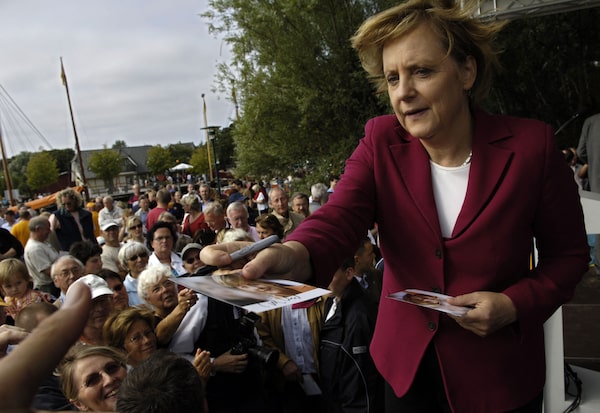
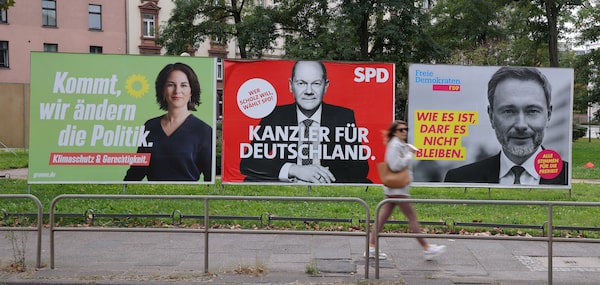
Germany's elections, then and now: At top, Ms. Merkel, whose Christian Democratic Union was then the opposition party, signs autographs at a stop in Ahrenshoop in 2005; at bottom, billboards in Frankfurt earlier this month promote chancellor candidates Annalena Baerbock of the Greens, Olaf Scholz of the Social Democrats and Christian Lindner of the German Free Democrats.Photos: ERIC FEFERBERG/AFP via Getty Images; Sean Gallup/Getty Images
Political ambidexterity
More than a decade and a half after that encounter, I’ve spent the past two weeks crisscrossing Germany and once again watching a transformative election for chancellor play out, in a country that’s been paralyzed by a yet another crisis – this one virological. It’s the fifth national election I’ve witnessed from within Germany but the first without Ms. Merkel on the ballot.
She is hardly absent, though. It’s as if the entire election, and a good part of the country, has become Merkel-shaped. Her party may very likely lose the Sept. 26 election, but her style, her message and her sharp delimitation of what should and shouldn’t be political priorities have saturated most of the political spectrum.
German streets this month are lined with big posters showing a black-and-white image of a dour, sober-looking candidate in conservative clothes, bearing stolid slogans like “Keeping your pensions secure.” To the apparent alarm of Ms. Merkel, that candidate is Olaf Scholz of the left-leaning opposition Social Democratic Party, and he appears poised to become her successor.
Mr. Scholz, who made has name first as mayor of Hamburg and then as a transformative finance minister in Ms. Merkel’s final coalition government, used to come off as a jovial, somewhat colourful figure with a common touch. But he has very deliberately remade himself in this election, shifting his style in debates and interviews to echo the patient and emotionless style of the Chancellor, casting many of his party’s policies in Merkelite messages of continuity and stability. His party even published one half-serious poster with the slogan “He can be Kanzlerin” – the female word for chancellor; a not-too-subtle way to say he’s ready to step into her beige pantsuit.
He’s done a noticeably better job of this than Ms. Merkel’s chosen Christian Democratic successor, Armin Laschet. The former premier of the prosperous state of North Rhine-Westphalia with generally moderate political views similar to hers, Mr. Laschet is also trying to echo his mentor, but he lacks the self-control and calm, and has damaged his chances by laughing during grim moments or flying into finger-wagging rage when calm is required. One of Ms. Merkel’s failings is her inability to groom successors within her party – Mr. Laschet was her second attempt, after her preferred candidate, defence minister Annegret Kramp-Karrenbauer, flopped politically amid numerous gaffes and scandals in 2020. For many Christian Democratic leaders, there has been an 11th-hour realization that a good proportion of their voters this century were never really casting a ballot for their party, but rather just for Angela Merkel.
One consequence of this is that Ms. Merkel is probably the first Western leader to have governed for more than a decade without becoming the personification of every voter’s disgruntlement – think of the way Jacques Chirac, Tony Blair or Pierre Trudeau had become synonyms for disgust at the end of their terms.
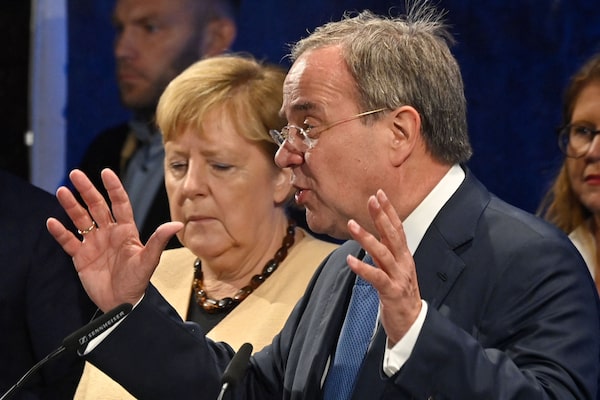
Ms. Merkel stands beside CDU candidate Armin Laschet at a Sept. 21 rally in Stralsund.JOHN MACDOUGALL/AFP via Getty Images
I had a sidewalk dinner in Dortmund this week with a table full of young voters, and they all told me they’d be casting their ballots for the Social Democrats or the Greens. One said she’d had it with years of “CDU policies” (not “Merkel policies”), especially around unemployment insurance and housing, but none of them had any beef with Ms. Merkel herself, and none named her as the problem they were opposing. She has managed to separate herself from her own party and elevate herself above it.
That’s partly because she, unlike both her predecessors, appeared to be utterly uncorrupted and uncorruptible, supremely ethical and monastically austere in her private life. She refused to move into the official chancellor’s mansion, instead residing with her husband in a small apartment above a pub near Berlin’s Museum Island for her entire period of office. According to a forthcoming biography by Kati Merton, none of her very trusted close-knit personal staff – an all-female group who have been with her for two decades and speak to her with extraordinary frankness – have ever been inside her home, and they have all continued to address her using the formal sie pronoun (like the French “vous”).
But it’s also because she really did seem to have something for everyone. Those young voters told me they admired her for having introduced same-sex marriage, eliminated nuclear power, expanded opportunities for women in politics and business, given Germany a minimum wage, gotten rid of mandatory military service, allowed a million refugees to enter the country in 2015, and handled the pandemic by voicing scientific competence and slapping down the deniers.
Conservatives stuck with her because she kept defence spending at 2 per cent of the budget, strictly enforced the “Black Zero” rule against deficits, was tough on crime, refused to expand the European Union, and kept her party firmly in a circle of right-wing politics at home and abroad.
That political ambidexterity was a very careful political tactic on her part, designed to defuse any major opposition from inside or outside her party. “Sometimes I’m conservative, sometimes I’m liberal, some days I’m Social-Christian (the name of her party’s further-right Bavarian branch),” she once said. It was only this month that she finally agreed to apply the word “feminist” to herself, despite her track record; she had previously wanted to appeal to the anti-feminists, too.
“She managed to modernize the Christian-Democratic centre-right, which had been languishing in opposition,” says Constanze Stelzenmuller, a Germany expert at the Brookings Institution. “She took a lot of those liberal and centre-left issues, and made them her own – and thereby sort of triangulated the Christian Democratic Union party into the middle of the political spectrum, and squeezed the Social Democrats to the wall so that for all of her 16-year tenure they had a really hard time.”
'Vote what makes Germany strong,' reads a banner at the CDU's Berlin headquarters showing (from right) Mr. Laschet, Ms. Merkel and ex-chancellors Helmut Kohl and Konrad Adenauer.Annegret Hilse/Reuters
The limits of Merkelism
To what end did she do this, though? In good part, simply to maintain power, to fend off a startling array of challengers from inside and outside her party, and to make her Christian Democrats the party for all of Germany.
But Ms. Merkel was not just an opportunist. She did have a strong sense of what was best for Germany, and what was best for Europe and the wider world – insofar as it made conditions better for Germany.
It is a particular vision of the country: as an export-driven, goods-manufacturing powerhouse. She and her governments were often accused of being supremely uninterested in cultivating Germany’s information-technology or service-industry strengths in any serious way (its internet backbone remains one of Western Europe’s worst). For most of those 16 years, there seemed to be little point – Germany enjoyed huge surpluses and full employment, buoyed by two timely phenomena: the rise of China as a major market for German exports and the role of the euro currency, created five years before she came to power, in channelling debt into Europe’s periphery and wealth into the continent’s German centre.
“I think Germany turned – partly due to her – into being the central player in Europe and a much more central player in the transatlantic Alliance over the last 16 years,” says Thorsten Benner, director of Berlin’s Global Public Policy Institute. “That happened not due to a particular approach of hers, but due to Germany’s relative success and weight in Europe, and due to the political stability that came with Merkel’s longevity.”
But with Ms. Merkel’s brilliant tactics has often come a lack of longer-term strategy, Mr. Benner concludes.
“My basic beef is that she hasn’t invested the incredible political capital and credibility she built up domestically in a way that could really prepare Germans for the more hostile, adverse and competitive world, and make the necessary investments in European competitiveness, innovation and the like that will ensure that Germany and Europe remain successful players in the coming decade.”
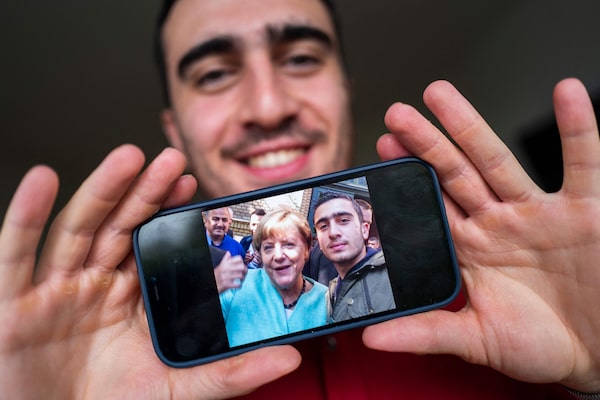
At his Berlin apartment earlier this month, Anas Modamani shows a selfie with Ms. Merkel from 2015, when he was a newly arrived 18-year-old Syrian refugee. Hundreds of thousands, many fleeing Syria's civil war, crossed German's southern borders that year, and Ms. Merkel's decision not to turn them away by force was a contentious issue in 2017's elections.JOHN MACDOUGALL/AFP via Getty Images
Ten years of crises
The strength in Angela Merkel’s approach is that it made Berlin the de facto capital of Europe, which it remains, and, for a while, the centre of the democratic world. The weakness, however, is that it deliberately avoided doing the best for either Europe or the democratic world. This is what political scientists Matthias Matthijs and Daniel Kelemen have called “Merkantilism” – which they define as “the systematic prioritizing of German commercial and geo-economic interests over democratic and human rights values or intra-EU solidarity.”
Ms. Merkel did not shape Germany this way through a predictable succession of patient acts. Rather, it was predominantly in her exhaustive handling of a succession of major crises that struck Europe, and the wider world, between 2010 and 2020.
The first, in 2010, was the implosion of the euro, provoked by the collapse of demand and debt emergencies on Europe’s fringes, destroying confidence in the currency. She was widely credited with helping save the euro – but only barely, and not for good.
At first, Ms. Merkel pushed to maintain the Frankfurt-based European Central Bank’s tight-money policies and her government’s refusal to provide large-scale bailout aid – a situation that benefited Germany’s exports but accelerated debt emergencies in Ireland, Spain, Italy and especially Greece. Only in 2011, at the urging of ECB chair Mario Draghi, did she shift to supporting that bailouts and money-supply expansions that eventually eased the crisis (but only after it had dragged on for years). And until 2020, she and her party continued to resist the one move that would have prevented future currency crises – the creation of a Europe-wide fiscal system.
The second crisis, in 2014, was the invasion of Ukraine and seizure of Crimea by Russia, a country with close economic and energy-supply ties to Germany. Ms. Merkel, fluent in Russian from her East German years, was adept at negotiating with Vladimir Putin and spearheaded the creation of the peace-talks mechanism. But she resisted tough sanctions and pushed through Russia’s completion of the German-financed Nord Stream II gas pipeline, designed to bypass Ukraine and deprive Kyiv of a key source of revenue. Germany continues to resist a full confrontation with Moscow.
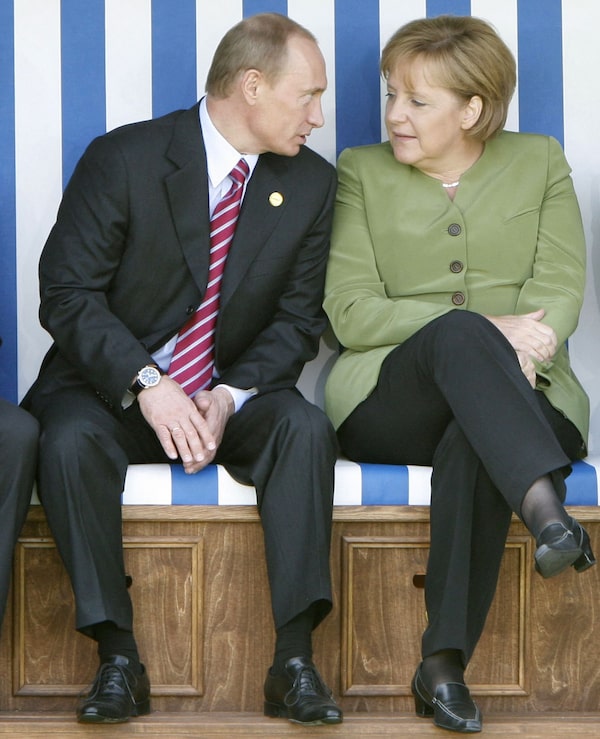
Ms. Merkel and Russian President Vladimir Putin speak at a 2007 summit in Heiligendamm, Germany.REGIERUNG online/AFP via Getty Images)
The third, in 2015 and 2016, was the crossing of Germany’s southern borders by around a million migrants from across the Mediterranean. This led to Ms. Merkel’s most dramatic move. Her decision not to send soldiers to block them by force, and instead to process them as potential refugees and settle those who qualified, was politically explosive, certainly weakening her in the 2017 election, and became a megaproject for every level of German government for almost two years. It was motivated by a mixture of humanitarian, public-image and economic concerns, and she later admitted she’d badly underestimated how difficult it would be.
It ended up being a political success: Germany’s gaping labour shortages meant a large proportion of the refugees became economically integrated fast, and within four years they had ceased to be a controversy – it’s notable that immigration has not been a significant issue in this year’s election.
But it was not part of a larger strategy. In later years, Ms. Merkel paid Turkey at least €6-billion ($9-billion) over four years (with similar amounts guaranteed in future years) to capture and hold all migrants leaving the Middle East and Central Asia through Turkey; she also backed a brutal Mediterranean interception protocol that does nothing to address the incentive to cross.
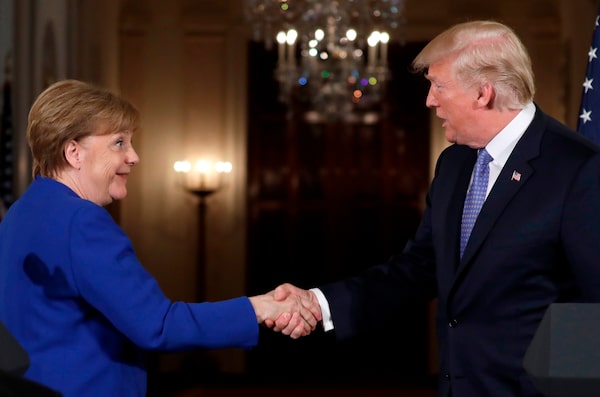
Ms. Merkel shakes hands with then-U.S. president Donald Trump at the White House in 2018.Evan Vucci/The Associated Press
The fourth crisis, peaking in 2016, was the shift of many of Germany’s neighbours, allies and trading partners away from democracy and sometimes into full-scale authoritarianism. Ms. Merkel was adept at preventing Donald Trump’s presidency from doing too much damage to Europe or NATO (in part by eventually ensuring she was never in a room with him, since she discovered that he flew into rages at the sight of her). She played an important guiding role in making sure Europe played tough with post-Brexit Britain, crippling the United Kingdom as a competitor and deterring any future countries from leaving.
But China’s descent under President Xi Jinping from comparative liberalism into a dangerously repressive totalitarian state, especially after 2017, did not elicit much response from Germany, whose huge car and equipment companies see China as a crucial export market. In fact, last year Ms. Merkel rushed to push through an attempted European free-trade agreement with China before President Joe Biden took office, so the Americans wouldn’t try to stop it (it ended up failing anyway). Closer to home, when Hungarian President Viktor Orban slid more or less completely out of the democratic world, Ms. Merkel’s Christian Democrats remained a key enabler, keeping Mr. Orban’s Fidesz party a privileged member of the Christian Democratic alliance in the European Parliament until this year.

Ms. Merkel tours BioNTech's COVID-19 vaccine plant in Marburg, Germany, with company founders Ugur Sahin and Özlem Türeci.Arne Dedert - Pool/Getty Images
The fifth crisis, in 2020, marked a seismic break from the dynamics of “Merkantilism.” It was the COVID-19 pandemic – and, more significantly, the near-breakup, financially and politically, of the European Union last year over the economic devastation caused by the harder-hit states having to shut down their economies and borders.
The European Union had no mechanism or institution to share medical resources or provide health care assistance (since health does not fall within its purview), and also had no way to provide financial assistance because of Ms. Merkel’s approach to the euro crisis and because her long-term opposition to fiscal union meant Germany had spent the decade opposing any French proposals to introduce Europe-wide bonds, pooled tax and spending systems. In the spring of 2020, it looked like the pandemic might bring an end to the union.
It ended up being saved: In late May, 2020, Germany ended its resistance and joined its rival in proposing a “French-German Initiative for European Recovery From the Coronavirus Crisis.” As a result, the EU eventually agreed to pool hundreds of billions of euros in shared assets, which were used to rescue faltering economies – in other words, it created (albeit on a short-term basis, for now) the sort of fiscal union Ms. Merkel had resisted. It was a big success.
It may have gotten the thumbs-up from Angela Merkel, but it was the work of her ambitious Social Democratic finance minister, Olaf Scholz, who developed the proposal and won over her longstanding resistance shortly before becoming his party’s candidate for chancellor.
It was very characteristic of Ms. Merkel that she would bend to incorporate this core idea of her left-leaning opponent into her political vocabulary, and even more characteristic that she would do so only after a decade of careful contemplation and delay, in order to defuse a crisis much bigger than Germany.
But it would also be a fitting end to her 16 years if she ends up being replaced by an opponent who has assumed her office only by carefully adopting her tone of voice, her posture, her modest dress, her plain speaking style and even sometimes her gender pronoun, all as part of a plan to undo core aspects of Ms. Merkel’s policy.
In a way, it would be the ultimate triumph of the Merkelist approach.
Merkel montages: A career in pictures
Blazers in an array of colours were a distinctive part of Ms. Merkel's image. In 2012, Dutch graphic designer Noortje van Eekelen combined some into a Pantone palette for an online project, and others would later make their own versions. The outfits shown here are from August, 2004, to August, 2021.Reuters
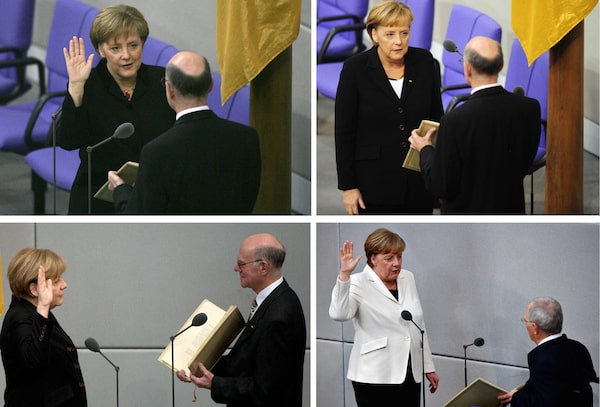
Ms. Merkel was sworn in as chancellor four times, and by two different presidents of the Bundestag, or national legislature: Wolfgang Schaeuble in 2018, bottom right, and Norbert Lammert in 2005, 2009 and 2013. Bundestag presidents have duties similar to a House Speaker in Canada, and are not to be confused with the federal president (currently Frank-Walter Steinmeier), who is Germany's head of state.AFP via Getty Images
From 2000 to 2021, Ms. Merkel and her husband, Joachim Sauer, are seen arriving at the Bayreuth Festival, an annual celebration of 19th-century German composer Richard Wagner. COVID-19 scuttled 2020's event, but it came back this past summer with its first female conductor, Oksana Lyniv of Ukraine. 'Finally!' Ms. Merkel said when asked about the historic first at a reception.Reuters
German chancellors traditionally address the nation in new year's speeches. Ms. Merkel's final address focused on the COVID-19 pandemic – which by that point had killed more than 33,000 Germans – but she ended by reminding Germans that elections were months away and this would be her last time welcoming a new year as chancellor.Reuters
 Doug Saunders
Doug Saunders